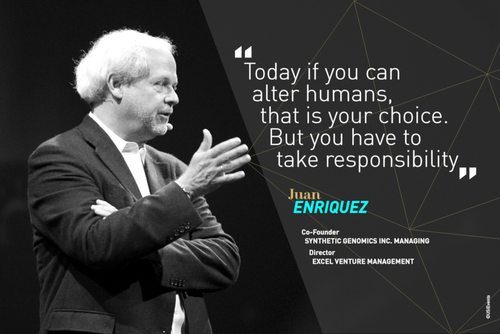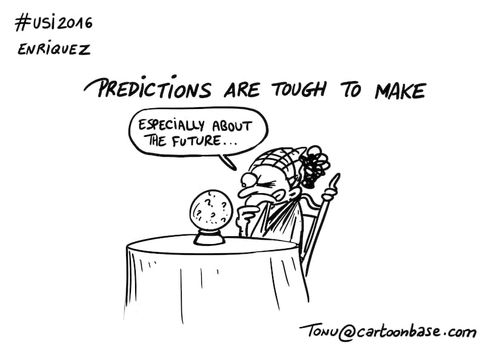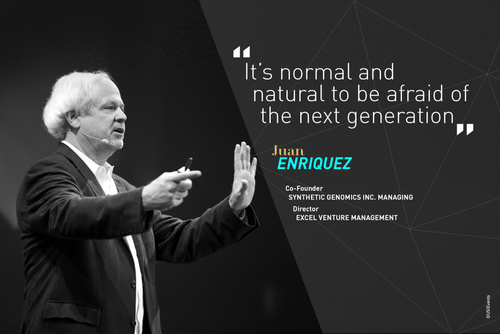Interview with Juan Enriquez: "It's all the experiments we make that lead to a revolution"
Technological discoveries, biological transformations... Why we should not be afraid of the future.
After Juan Enriquez' talk "Homo Evolutis" at USI 2016, we wanted to learn more about his vision on the tricky relationship between humans and new technologies.
Are we really the drivers of our own evolutionary path?
Yes, definitely. Actually, it’s not up to a handful of people to decide of course. Moreover, it doesn’t even work that way. It’s hundreds of thousands of daily experiments that allow us to tweak this or tweak that... A bit like building a sand castle: individual grains of sand become one big construction. People start by thinking “How do I cure aids or cancer?”, “How do I take somebody who’s very short and make him taller?”. And all of that together leads to very big changes. It’s all the experiments happening on a different level that lead to a revolution.
“It’s all the experiments we make that lead to a revolution.”
Can we really trust humans to make good use of these discoveries? Mankind hasn’t always act with wisdom...
What are the alternatives? Would I rather have much smarter or wiser humans running politics for example? Sure. But you have to work with what you’ve got. Simple as that!
Because of technology, we are evolving ourselves. During one of our interviews, Yuval Harari said “Our successor might not be human at all, that might not even be organic”. Would you agree?
Yes, I think that’s absolutely right. If we ever wanted to leave the solar system, there is no way we could do it with our current biology. DNA is too fragile. It would require a deep reengineering of the human body, to become much more radiation resistant for example, or to be able to breath in a different atmosphere.
We’re born with one cell and we become ten trillion cells. Sometimes things go horribly wrong during the process – that's how you get genetic deformities, or your body feeling like it’s not the same sex as your mind think, etc. It all has to do with this cascade of cells and hormones.
If you try that cascade of one to ten trillion cells in a gravity that is ⅓ of Earth, what’s the outcome? I’d be surprised if we could have babies on Mars giving our current biology...
So we might have to do some fundamental reengineering even for the nearby planets. And that’s non-selective pressure to do that. It’s not because we’re being pushed in a Darwinian way on Earth to evolved in that direction. It’s because we’re deliberately saying “I am going to change my environment and therefore I have to engineering some trades. And that’s a different evolutionary logic.
Read more : Our interview with Yuval Noah Harari - "Our successors may not be human at all..."
Your studies brings you to amazing, and perhaps terrifying discoveries and prospects...
Why terrifying? Imagine you were born at a different time. You’re going to be born at random, and you don’t know where or how. So you don’t know what you’re going to look like, if you’re going to be rich or poor, smart or not. If you think of that in historical terms, not knowing if you’re going to be the child of a king or a peasant (which was much more likely!), would you rather have been born into 1500, 1600, 300…
I think the answer is pretty clear. You have much better chances at survival, getting an education or having your human rights protected today. It’s not perfect. But we’re doing a hell lot of a better job than even 30 years ago, concerning poverty, health... We’ve eliminated most of the childhood diseases, motherhood’s deaths, etc.
So when you say “isn’t this a scary world?”, the answer is yes. But the second part of it is, compared to what? Every generation thinks the world is about to end… And sometimes, they’ve been close to right!
Do you think it’s in our nature to be scared of changes and new technologies, and permanently fear the end of the world?
I think it’s useful to have people who are optimistic and useful to have people who are scared. You know there is actually a physical reason for people who are shy. Social networks typically looks like spider webs. There are people very tightly coupled to the centre who have hundreds of friends. And others way out on the periphery, who will have two friends. The question is: where do you want to be? Of course the answer depends.
If you’re a newspaper editor or social media manager, you’d want to be right in the centre. But what happens when there is an epidemical flue? The chances the person at the centre dies are much higher than somebody who has 3 friends. So there is a reason to have shy people. They survive.
Sometimes, some of the great ideas come from people at the periphery because there are not yammering about the same things all day long. They are off thinking by themselves. That’s why it’s so important to lesson to shy people and ideas that are different from yours, even if you don’t agree with them.
It’s the second time you talked at USIEvents. What are your views on the event?
It’s an impressive event! The first time I was invited, it was in a tent: it was much smaller, it had a lot of energy and wasn’t as institutional. They’ve certainly upgraded the venue. There is real engagement by the audience.
I think having things like lunch boxes for four people is a great thing to do, because it invites people to share a moment. As the event grows, it’s gonna be even more important to create groups that connect to one another. Because it’s very easy to get isolated, or only talk to people you know. Thinking about that, I think going forward is going to be part of making this a community as opposed to an event.
People start coming back to USI, seeing friends, sharing ideas… and it becomes part of their yearly ritual. And if they’re willing to embrace people who have a name-tag saying this is their first time here, or become host for them and bring them into the community... Then I think we’ve got something long lasting.

Who would you like to see at USI next year or in the years to come ?
Actually, it depends what you want. Some conferences really focus on whether or not you can speak and express yourself well. And some of the smartest people on earth can’t do that.You have to figure out what your audience wants: does it want to be entertained, while they learn? Does it have the patience to listen to a speech that could be lousy, yet extremely important? A lot of writers for example are really bad speakers. They tend to read some passages of their books because they feel uncomfortable, and they don’t work with words in the same way.
There is a lot of people who are very smart but slightly aspergers, or shy. So it mainly depends on what you and the audience wants, and what you want to get out of it.
To go further, discover Juan Enriquez's talk on our Youtube channel and the questions asked by the participants during the conference.




